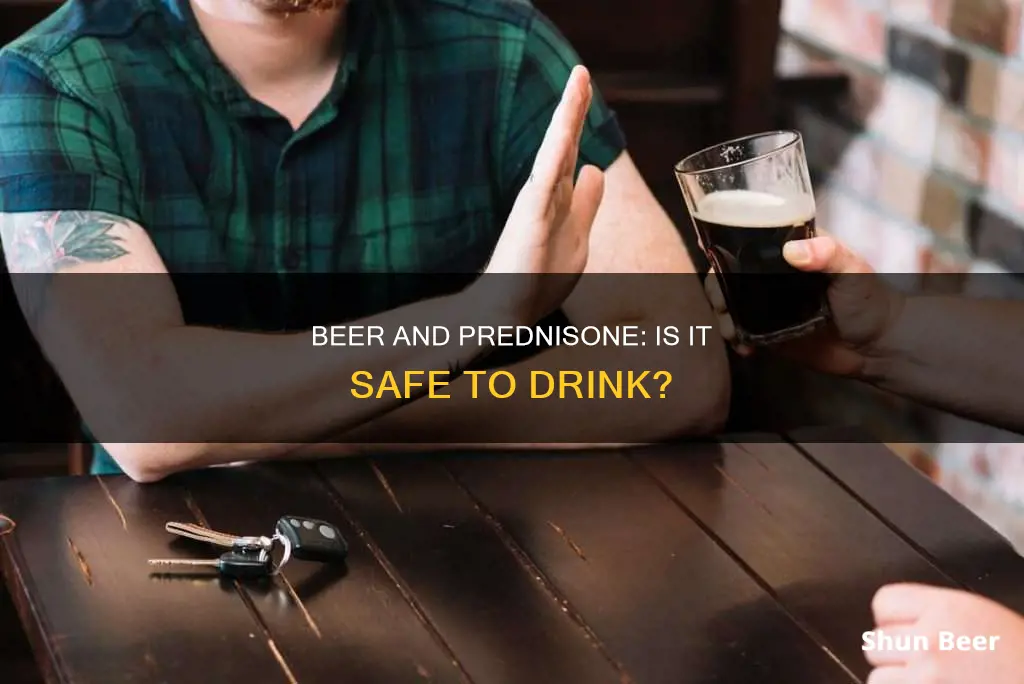
Drinking alcohol while taking prednisone is generally not recommended. While there is no direct drug interaction between the two, they have similar side effects, and consuming them together can increase the risk of experiencing these side effects. These include gastrointestinal issues, weakened immunity, mental health changes, high blood pressure, weakened bones, electrolyte imbalances, altered blood sugar levels, and weight gain.
The risks also depend on several factors, including the dosage and duration of prednisone treatment, the amount of alcohol consumed, and any existing medical conditions. It is always best to consult a doctor before consuming alcohol while on prednisone treatment. Abstaining from alcohol until after the completion of treatment is generally recommended.
| Characteristics | Values |
|---|---|
| Is it safe to drink beer while taking prednisone? | It is not recommended to drink alcohol while taking prednisone as it can increase the risk of side effects such as weakened immunity, gastrointestinal issues, and mental health changes. However, occasional light drinking may not lead to severe side effects. |
| What are the side effects of drinking alcohol while taking prednisone? | Increased risk of infections, gastrointestinal problems, mood alterations, high blood pressure, weakened bones, electrolyte imbalances, altered blood sugar levels, and weight gain. |
| Who is at greater risk when mixing alcohol and prednisone? | Women and older adults are at greater risk as they have higher blood alcohol levels and may take longer to metabolize it. |
| How long after taking prednisone can you drink alcohol? | It is generally recommended to wait until the treatment with prednisone is completed before drinking alcohol. The half-life of prednisone is around 2 to 3 hours, and it can stay in the system for 12 to 15 hours or more. |
What You'll Learn

Alcohol and prednisone both suppress the immune system
While there is no direct drug interaction between prednisone and alcohol, it is not recommended to mix the two. This is because both substances can suppress the immune system, and combining them can increase the risk of infection.
Prednisone is a corticosteroid medication that helps to balance hormones and reduce inflammation by suppressing the immune system. It is often prescribed to treat autoimmune conditions, such as rheumatoid arthritis, severe allergic reactions, lupus, multiple sclerosis, and arthritis.
Alcohol, on the other hand, is a central nervous system depressant, slowing down the body's activity. When combined with prednisone, alcohol can worsen the side effects of the medication, including damage to the stomach and gastrointestinal tract, changes in blood sugar levels, dehydration, impaired wound healing, and the development of type 2 diabetes.
Additionally, both alcohol and prednisone can increase the risk of osteoporosis, or weakening of the bones. Regular alcohol consumption is also associated with a higher risk of bone fractures.
The combination of alcohol and prednisone can also lead to toxicity, liver damage, heart damage, and an increased risk for various other conditions. The negative effects of both substances can be intensified when mixed, and even occasional binge drinking can disrupt the immune system and make it easier to get infections.
Therefore, it is generally recommended to abstain from drinking alcohol while taking prednisone. If you are taking prednisone, it is important to speak to your doctor about whether it is safe to consume alcohol, as the risks may depend on factors such as dosage, length of treatment, frequency of alcohol consumption, and any other medical conditions.
Keto Acid and Beer: One Drink's Impact
You may want to see also

Prednisone and alcohol can each irritate the digestive tract
While there is no direct interaction between prednisone and alcohol, it is not advisable to consume them concurrently. This is because both substances can irritate the digestive tract and cause peptic ulcers.
Prednisone is a corticosteroid that helps to balance hormones and suppress inflammation. It is often prescribed to treat autoimmune conditions such as asthma, rheumatoid arthritis, and allergies. As a strong anti-inflammatory medication, it also suppresses the immune system, reducing swelling and irritation. However, this suppression comes with its own risks.
Alcohol, on the other hand, is a central nervous system depressant that can also irritate the stomach lining and digestive tract, leading to heartburn and stomach ulcers. When combined with prednisone, the risk of gastrointestinal distress, nausea, and digestive discomfort increases. This is especially true for those already prone to indigestion or stomach upset.
In addition to the increased risk of gastrointestinal issues, the combination of prednisone and alcohol can also lead to a compromised immune system. Both substances suppress the immune system, making it more difficult for the body to fight off infections and illnesses. This effect is further exacerbated if the individual is taking prednisone long-term.
The concurrent use of alcohol and prednisone can also impact bone health. Prednisone has been linked to a decrease in bone mineral density, increasing the risk of osteoporosis and bone fractures. Excessive alcohol consumption, particularly at higher amounts (3 drinks or more per day), is also associated with a higher risk of osteoporosis. Therefore, drinking alcohol while taking prednisone may further increase the risk of bone health complications.
While the immediate risks of combining alcohol with prednisone are concerning, there are also potential long-term consequences. The liver is particularly susceptible to the combined effects of these substances, which can contribute to chronic liver damage and conditions such as fatty liver disease, alcoholic hepatitis, or cirrhosis. Additionally, the combination may elevate the risk of long-term heart problems, including hypertension, cardiomyopathy, and an increased likelihood of heart attacks.
Given these risks, it is always best to consult with a healthcare professional before consuming alcohol while taking prednisone. They can advise based on individual medical history and help weigh the potential risks. Abstaining from alcohol during the treatment period may be the safest option.
Epilepsy and Non-Alcoholic Beer: Is It Safe?
You may want to see also

Prednisone and alcohol can both cause weight gain
While there is no direct drug interaction between prednisone and alcohol, it is not a good idea to mix them. This is because prednisone and alcohol have similar effects on the body, and taking both at the same time can increase the risk of these side effects occurring.
Prednisone is a corticosteroid that can be prescribed for autoimmune health conditions such as severe allergic reactions, asthma, and rheumatoid arthritis. It is a strong anti-inflammatory medication that suppresses the immune system, reducing swelling and irritation. A common side effect of prednisone is weight gain, which is more likely to occur with long-term use or higher doses. Prednisone can cause weight gain by increasing appetite, altering how the body processes sugar and fats, and redistributing body fat to areas such as the face, back of the neck, and abdomen.
Alcohol is high in calories and can cause weight gain on its own. Drinking alcohol while taking prednisone could potentially lead to more weight gain or make it harder to lose weight. Additionally, alcohol can worsen some of the side effects of prednisone, including changes in blood sugar levels, damage to the stomach and digestive tract, dehydration, impaired wound healing, and the development of type 2 diabetes. Both substances can also suppress the immune system, increasing the risk of infection.
Therefore, it is generally recommended to limit alcohol consumption when taking prednisone, especially for those taking the medication long-term. However, small amounts of alcohol while on prednisone are usually safe if you do not have an existing health condition. It is important to speak with a healthcare professional for personalized advice.
Catholics and Good Friday Beer: What's Allowed?
You may want to see also

Alcohol may alter the way the body metabolizes prednisone
The liver metabolizes prednisone into prednisolone, which is then excreted in the urine. The liver also breaks down alcohol, and when alcohol is consumed, it may alter the way the body metabolizes prednisone. The impact of alcohol on prednisone metabolism can depend on several factors, including the amount of alcohol consumed, the dosage of prednisone, and the duration of treatment.
It is important to note that there are no clinical studies examining the direct interaction between alcohol and prednisone. However, due to their similar effects on the body, combining them may increase the risk of certain side effects. For example, both substances can suppress the immune system, irritate the digestive tract, and cause changes in blood sugar levels. Therefore, drinking alcohol while taking prednisone may increase the risk of infections, gastrointestinal problems, and blood sugar imbalances.
Additionally, long-term use of prednisone and alcohol can have adverse effects on bone health, potentially leading to osteoporosis. Alcohol consumption can also promote weight gain, which is already a possible side effect of prednisone.
In conclusion, while there may be no direct drug interaction between prednisone and alcohol, the combination of the two can enhance certain side effects. It is always advisable to consult a healthcare professional before consuming alcohol with any medication, as they can provide personalized advice based on an individual's medical history and other factors.
Beer and Type 2 Diabetes: What's Safe to Drink?
You may want to see also

Combining alcohol and prednisone can increase the risk of infections
Prednisone is a prescription medication that helps balance your hormones. It is a strong anti-inflammatory medication that suppresses your immune system, reducing swelling and irritation. It is often prescribed to treat inflammatory conditions, such as rheumatoid arthritis, multiple sclerosis, and lupus. It may also be prescribed to treat serious allergic reactions, certain types of cancer, and inflammation of the eyes, skin, lungs, stomach, and intestines.
Alcohol, on the other hand, is a central nervous system depressant that can also suppress the immune system. When consumed in large amounts, alcohol can irritate the stomach lining, leading to heartburn and stomach ulcers. It can also cause blood sugar levels to drop, which can be dangerous for people with diabetes.
When combined, alcohol and prednisone can increase the risk of infections because they both suppress the immune system. This means that your body may not be able to fight off infections as effectively as it usually would. Additionally, the combination of these two substances can delay the signs and symptoms of infections, leading to a delay in getting treatment.
It is important to note that the risk of infection is higher in individuals who drink heavily or frequently, as well as those who take prednisone long-term. Therefore, it is generally recommended to avoid alcohol until the treatment with prednisone is completed. Consulting a healthcare provider before consuming alcohol while on prednisone treatment is always advisable.
Beer and Ibuprofen: Safe Mix or Health Risk?
You may want to see also
Frequently asked questions
It is not recommended to drink beer or any other form of alcohol while taking prednisone. Although there is no direct drug interaction between the two, they have similar side effects, and consuming them together can increase the risk of these side effects occurring. It is best to consult a doctor before drinking any alcohol while on this medication.
Both prednisone and alcohol can suppress the immune system, so combining them may increase your risk of infection and make it harder to recover. They can also cause gastrointestinal issues, changes in blood sugar levels, weakened bones, weight gain, and mental health changes.
Alcohol can worsen some of the side effects of prednisone and increase the likelihood of adverse effects. It can also disrupt the metabolism and alter the way the body metabolizes prednisone.
Yes, women and older adults may be at higher risk of experiencing negative effects when mixing prednisone and alcohol. Women tend to have higher blood alcohol levels and may take longer to metabolize it, while older adults have lower alcohol tolerance.
It is generally recommended to wait until you have completed your treatment with prednisone before consuming any alcohol. The half-life of prednisone is around 2-3 hours, and it can stay in your system for 12-15 hours or more. Consulting a healthcare provider for specific recommendations is advised.







